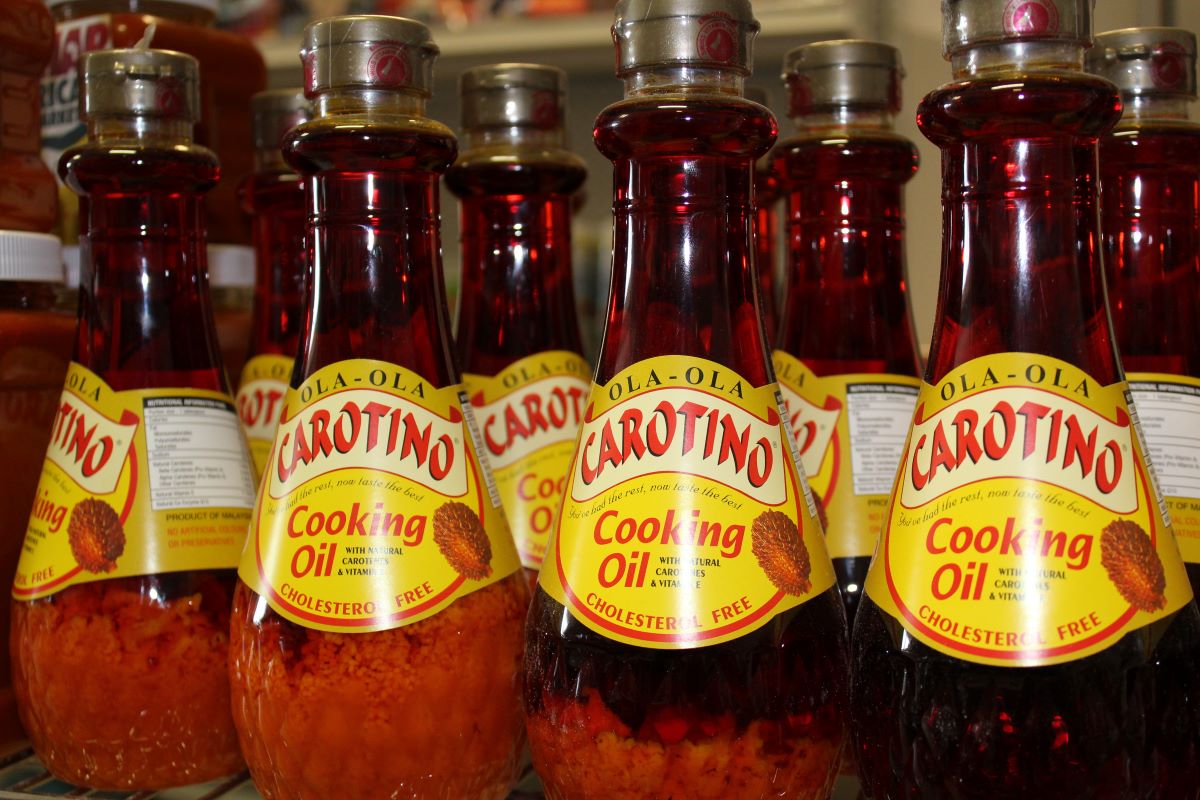Ashar African Market, located on the corner of University and Cunningham in Urbana, is one of the few African grocery stores in Champaign-Urbana. Located in the same strip mall as El Progresso and El Oasis in Urbana, Ashar is a modestly-sized grocery store that is very approachable for a quick grocery stop. It specializes in West African groceries, but also carries an eclectic mix of other products.
Curious what you might find there?
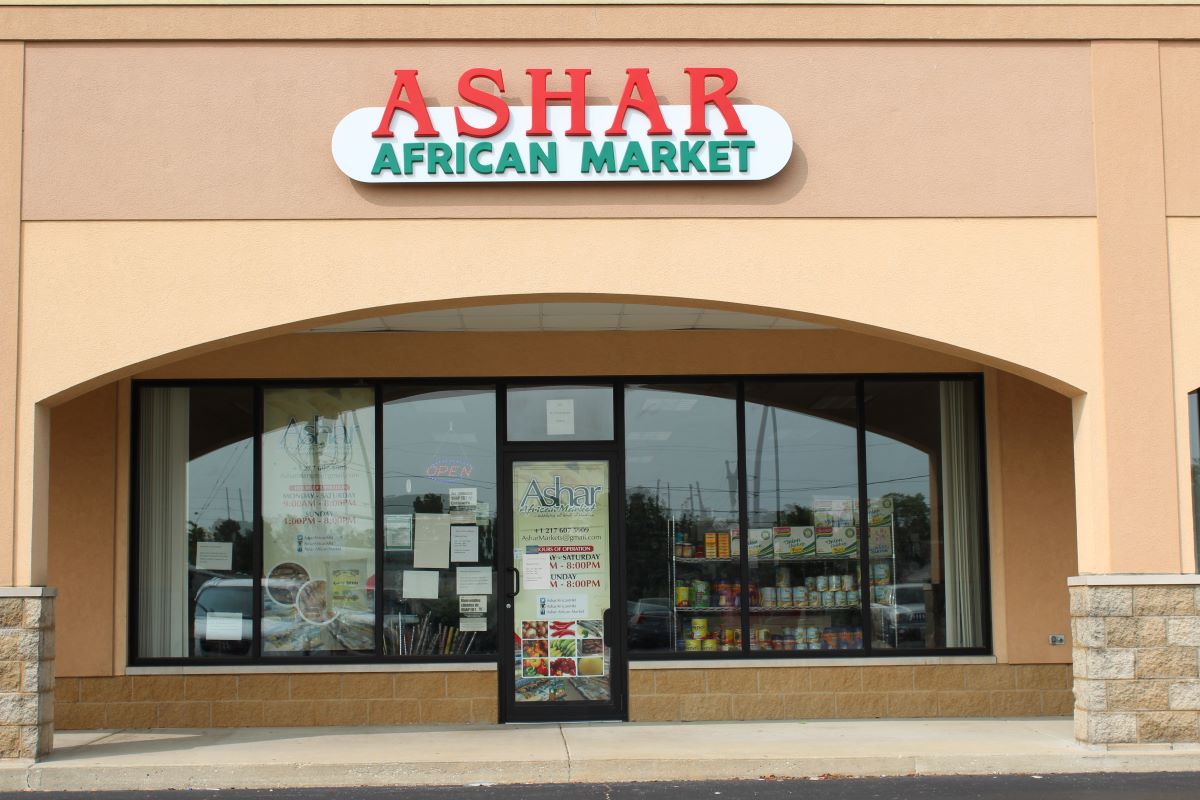
Photo by Tias Paul.
Walking in, you will find a fresh produce table to your right, and three rows of neatly arranged dry goods shelves directly in front of you. There is a refrigerated section on the left wall, and the right wall houses toiletries, paper goods, kitchen items, greeting cards, and even some vividly colored Nigerian tunics. Due to the size and layout of the store, you can easily pick out what you are looking for at a glance.
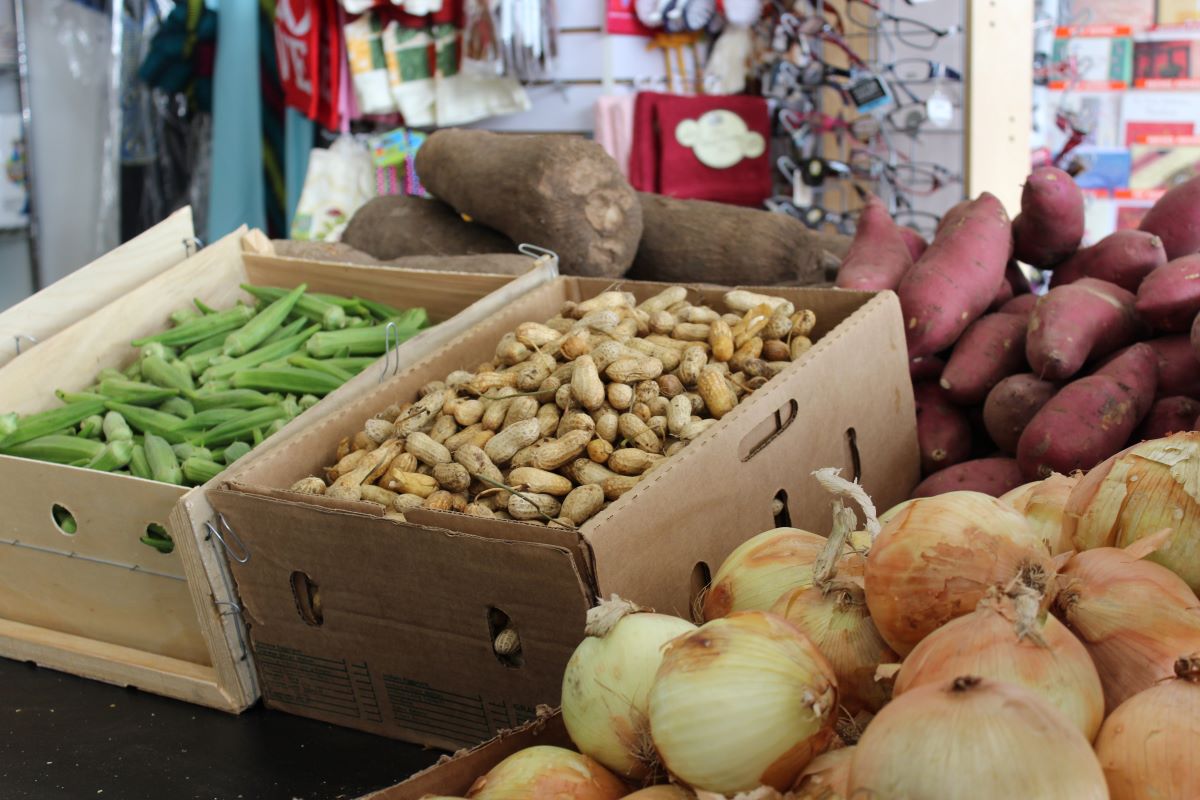
Photo by Tias Paul.
Fresh produce arrives every Monday. Based on the signage, I am guessing some items had sold out by the time I made my stop on a Saturday. I still found plenty of root vegetables and peanuts on the produce table and more perishable items like plantains, greens, hot peppers, and tomatoes were stowed away in the refrigerated section.

Photo by Tias Paul.
The grains and legumes section was quite the treasure trove of starches. Along with common items such as rice and black eyed peas, the adventurous cook can snatch up unique flours such as cassava, plantain, and many others that I did not recognize. Those looking to simply sample some of these will be pleased with the smaller quantities available on the shelves, but bulk quantities are also available towards the back of the store. Don’t know what an item is or how to cook it? The staff is happy to help with tips and recipes.
Ashar also had quite the interesting selection of fish and meats. I spotted several varieties of dried fish, including crayfish and stock fish, and frozen fish such as whole tilapia and salted cod (bacalao). Canned mackerel and sardines also made an appearance on the shelves.
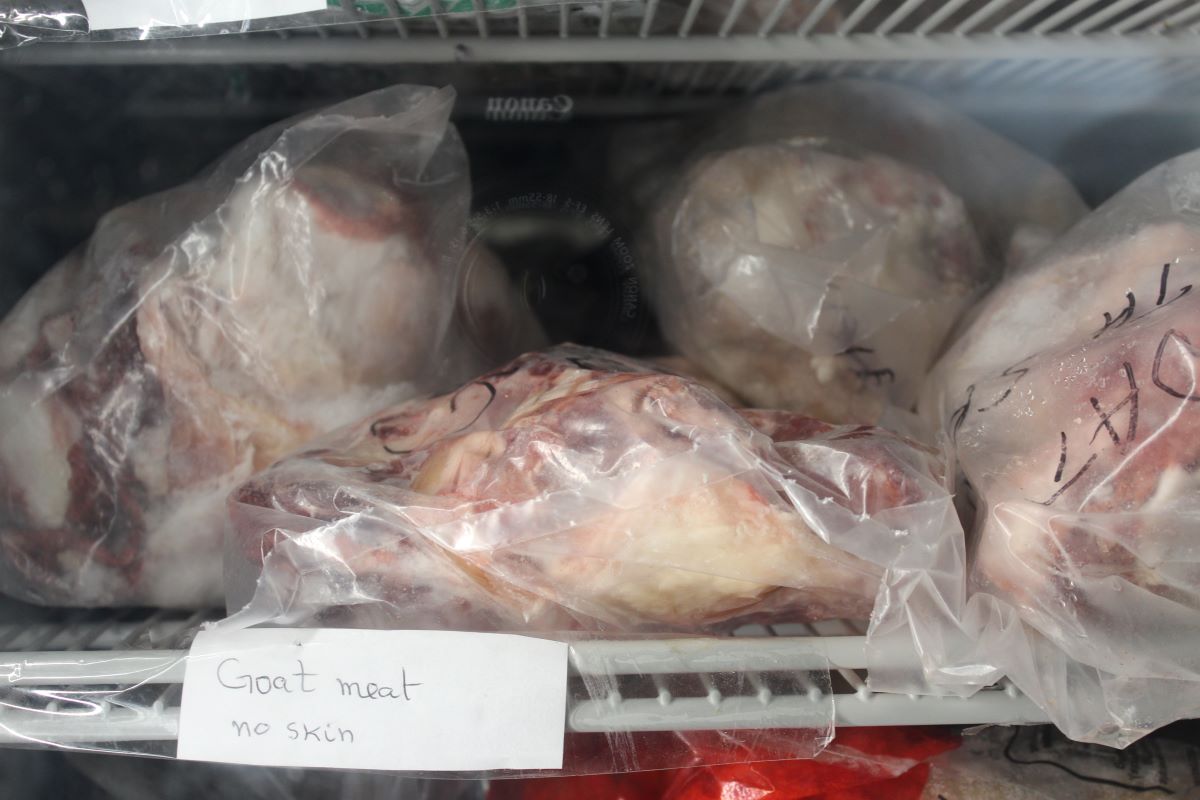
Photo by Tias Paul.
If you’re looking for unique cuts of beef like cow leg or oxtails, you’re in luck. You’ll find these in the frozen section, conveniently located across from the oxtail seasoning on the spice racks. For me, the highlight of my visit was the generous selection of goat meat which has been an elusive item to find in Chambana. I was thrilled to discover that the portion of goat meat I bought came with marrow bones. If you love marrow as much as I do, get in line. I’m well on my way to instituting Sunday goat meat curry in my household now. I can already feel my Bengali ancestors solemnly nodding their approval.

Photo by Tias Paul.
Oils and spices, yes. African spices mingled with Caribbean flavors. Jollof rice seasoning shares a shelf with jerk seasoning and various pastes and butters. I was particularly taken with a row of golden-orange hued bottles of something called Carotino cooking oil. I have no idea what it is or how it is used, but I think I want it in my kitchen.
I had the pleasure of chatting with one of the co-owners of Ashar and finding out how this store came to be.
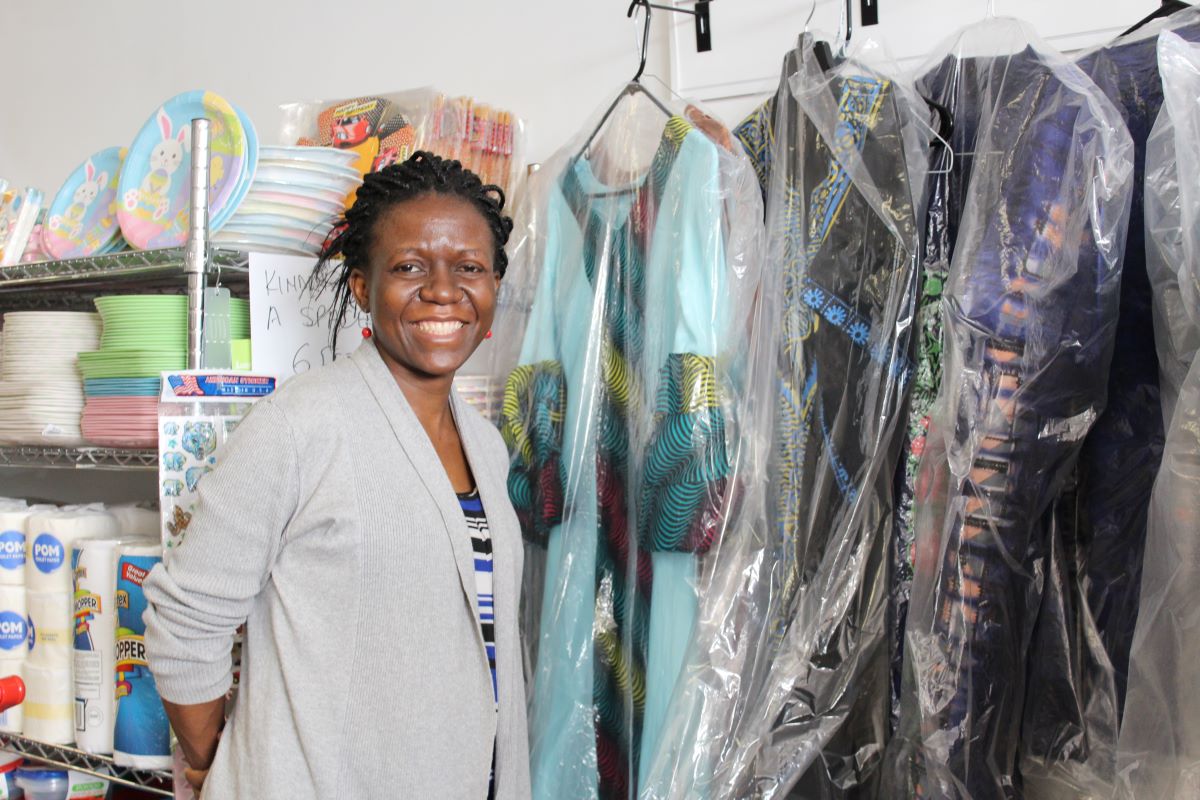
Adesola Babalola. Photo by Tias Paul.
Smile Politely: Could you tell us a little bit about yourself?
Adesola Babalola: Hi, my name is Adesola Babalola, and I came to the United States in 2002, so I’ve been here for like 18 years. It’s been a journey for the 18 years. I’ve seen a lot of growth. I’ve been able to go to school. I’ve been able to see opportunities.
SP: Where did the idea to open Ashar come from?
Babalola: One of the things that I found out when I went to school was that some food for different ethnicities are not available near the school. So when I had the opportunity to be in the Champaign-Urbana area and I know that there is a school in this area, the University of Illinois, I decided to open this store because there are so many people that work here and live here that do not have access to the food that they would typically eat if they were not away from home or from their countries. So that is part of the reason why this store was opened. Another reason is being able to give people an opportunity to work and to actually earn a living.
SP: How long have your doors been open? How has Ashar evolved during this time?
Babalola: So we started in December 2017, and we’ve been able to grow. It’s been amazing, comparing the picture of where we started and what we are right now.
SP: The name of the store is “Ashar.” What does it mean?
Babalola: Well, “Ashar” means blessed, and this is paramount to me; this is so pertinent to me. I believe in blessings, and I believe in providing blessings to people. I’m a Christian, so I believe in God, so everything I do, I incorporate that. So when the thought of starting this business came up, one passion that I have is being able to bless the people that come to my store with what I sell, so everything that we sell they are nutritious. We don’t sell things that are not good. We try to make sure we get quality food, and our motto is “blessed food, blessed life, good health.” So you will be able to eat good food. You’ll be able to have good life, and you’ll be able to have good health. So that is one of the goals that we have. We believe people can actually maintain good life and good health by eating healthy.
So most of the food that we sell, they are raw food you have to prepare by yourself. So you can get fresh plantain, fresh okra, fresh peanuts, and be able to make the food by yourself. You don’t have to have all the artificial things that are added to food that many times are not healthy. You can actually make this food as quickly as possible, like you don’t have to spend two hours making dinner. You could make your dinner within 30 minutes or even ten minutes. If you get plantain and if you get rice and then you get some melon — however you want to make it — you could quickly make it with the fresh ingredients that we have. We also do provide some education — like if somebody wants to buy something and they don’t know how to make it — we also provide that to our customers. We kind of guide them to different things they could make out of the products that we sell.
SP: How have you had to adjust your business practices in response to COVID-19? Any big changes or different services?
Babalola: Oh yes, so when the COVID hit in March, basically we had to close for some days. Later on, we found out that it is okay for grocery stores, businesses that sell food, to open and to continue to sell. So first, we lost some revenue from when we were closed.
We were able to reopen. When we reopened, we had to provide some safety things that were needed like notices, letting our customers know that they need to wear their mask, and they need to maintain social distances. We needed to, of course, educate our employees as well to make sure that they are protected, and they are also well informed to talk to the customers about the things that should be done and maintained. Since the time we opened, we’ve been able to maintain our opening.
Another change that we had was reducing the hours. So initially, prior to COVID, we were open from 9 in the morning till 8 at night, Monday through Friday, but since the COVID, we had to reduce the hours because when the COVID hit, you know, when it was really — many people were not coming out, so we were open for hours in the morning, and nobody would show up, so we had to shift our opening hours up a little bit. But things are kind of normalizing back, so that’s good.
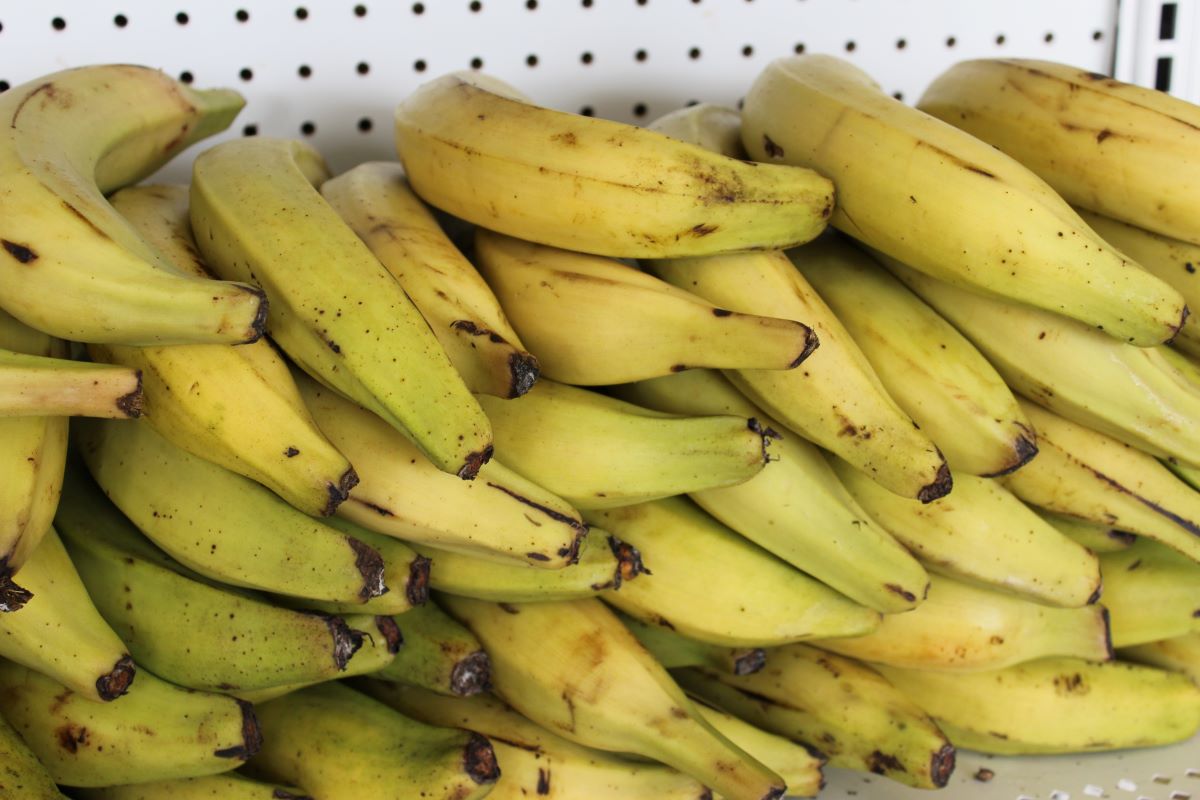
Photo by Tias Paul.
SP: Have you been surprised by the popularity of any particular items at Ashar?
Babalola: Yeah, so some of the items that are highly popular are some items that kind of cut across different ethnicities, for example, fresh plantain. Different countries and different ethnicities eat fresh plantain, so I have people from Africa, people from East, from Asian countries, Hispanics, so different ethnicities, different countries, and they come for plantain. Sometimes we get plantain, and before we know it, it’s all gone because everybody wants it. We have a challenge here about getting fresh produce like that, and it is the location. We would like to get all this fresh product on a daily basis, if possible, but it looks like we don’t have suppliers around here that could supply everyday. Some of the suppliers that we found, they would want us to buy a whole lot of inventory for each delivery, but the fresh produce we don’t really have to get a lot of it everyday because it is perishable. So that is the challenge we have, but we still try to keep up with the demand.
So we have fresh plantain, we have yam. Yam is a tuber product that I’m sure many African countries, they eat it. Also we have some like Yama potatoes, that one also goes really quickly. We have fresh peanuts, that could be roasted or boiled, so things like that, and fresh okra. So I think the things that are on high demand are fresh foods which is something that we are excited about because we want our people to eat fresh food.
SP: Is there anything you would like to tell our readers?
Babalola: Well, I wanted to mention that Ashar has almost everything you would want to buy. We have so many things that are not even food products. We just want to make sure that when our customers come, they could possibly get everything they left their house to get before returning home. So we have toiletries. We have cutleries. We have plates. We have kitchen items. We have frozen foods, and we have frozen vegetables. Especially students or people that don’t have to keep going out every so often, they could buy whatever they need. We sell flours, the grains, like rice, like maize flours, like rice flour, yam flour. We sell them in small packaging and also in big bags. We have 50 pound bags and five pound bags. Some people travel from two hours away actually, and they buy 50 pound bags of different things, so it could last them for a month, two months before coming back. So I just wanted to mention that to our customers that everything you may want, we have. Even if we don’t have it, let us know; we are excited to get them and make them available.
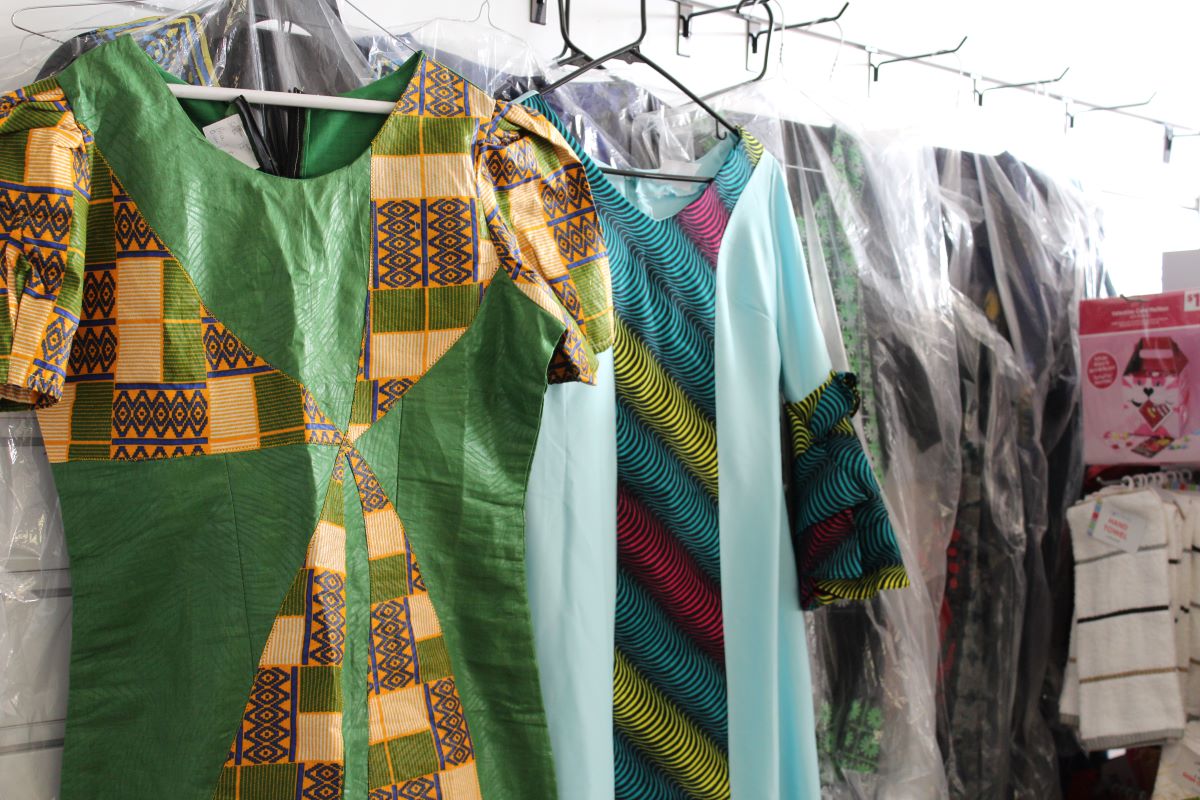
Photo by Tias Paul.
We also have clothing. We have African attires. We have dresses that are not African. We have people that sew; it’s like you tell us what you want, we can sew it customized to your taste, and then you could come back to get it.
Ashar African Market
510 N. Cunningham Ave
Urbana
M-F noon to 8 p.m.
Sa 9 a.m. to 8 p.m.
Su 1 p.m. to 8 p.m.








